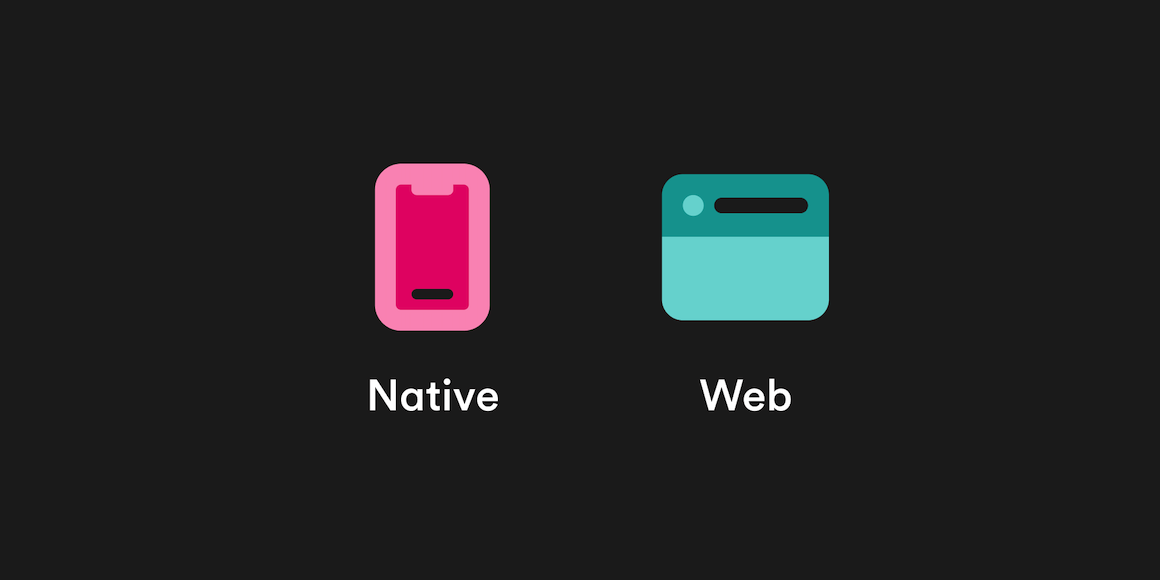
Mobile devices are the primary driver of e-commerce. In 2021, smartphones accounted for almost 70 percent of retail website visits worldwide, and there’s no sign of that changing. Your business needs to get on board the mobile express. Shifting your tools to apps keeps you competitive by automating your business and bringing value directly to your customers through their primary device.
If you’re already exploring app development, you probably have an idea of what you need your app to do. However, you need to know your options for building it and making it work.
We’ve talked before about the types of apps you can build for your business, with native and web apps leading the pack. Let’s dig into how they stand up to one another:
What is a native app?
A native app is a software application built for a particular platform—such as iOS or Android. Each platform also uses a specific programming language. Swift or Objective-C serve as the basis for iOS apps, and Java is behind the curtain of Android apps. When you say “mobile app,” native apps are what most people think about. These apps are downloaded from an app store and live on your phone, using its functions and features.
Native app pros
Native apps give you and your users various advantages, and they’re built to take mobile devices into account. Users know the benefits of downloading a native mobile app. For instance, native apps:
- Provide the fastest and most reliable experiences for users.
- Make it easy to tap into device functions—like cameras or microphones. These apps may be the only way to provide core functionalities for your service.
- Generally feature a familiar user experience (UX) so that users know what to expect and how to use your product.
Native app cons
The biggest deterrents for companies deciding between native versus web apps are time and money—and native apps potentially require a lot of both. For instance:
- Native apps have to be built individually for each platform—Android, iOS, or both.
- Native apps require a larger investment if users are split between platforms.
However, when quality is your priority, a few drawbacks don’t matter.
Work with your development partner to research app user data and choose the right platform(s) for your needs. In 2019, Android had an 87 percent share of the global market, but is it right for you?
What is a web app?
A web app is a software application accessed through a web browser—such as Chrome, Firefox, Safari, or Edge—using the internet.
Wait a second … that sounds like a website. What’s so special about a web app?
We could get off track here, but the short story is that a website is informational and acts as a marketing tool, whereas a web app provides more functionality and meshes with the sales side of your business.
Web app pros
As you work to build and deploy the next great thing in the app world, flexibility is crucial. Web apps allow for that, both from a user and a cost perspective. For instance, web apps:
- Don’t have to be built for one platform.
- Don’t take up memory or storage on your device.
- Come in different types with new functionalities, like progressive web apps that allow push notifications.
- Require a smaller investment over building native apps for multiple platforms.
Your unique app requirements will ultimately dictate cost and project complexity, but web apps offer many benefits that companies can’t ignore.
Web app cons
Of course, web apps might not have that oomph, pop—or whatever other buzzword you can think of—about them. Web apps can suffer because they don’t always go the extra mile for users. For instance, web apps:
- Can be a one-size-fits-all solution—that could actually cost you more in the long run.
- Often offer good, but not great, UX (since they attempt to mimic the native experience). This means you may not meet your users’ high expectations.
- Live just outside the native ecosystem, which creates friction if the typical user environment is native. For example, using a web app on the go means you’d have to open a browser, which may encourage users to download a competitor’s native app on their mobile device instead.
If you plan to build a web app but not a native app, it’s important to consider where your customers are today—and where they might be down the road. To future-proof your app, think about your ideal platform. If your ideal platform is native and you have already invested in a web app, now you also need to build a native app—which means more money spent in the long run.
Some of the best-known tools started as web-based apps and still have web-based versions, including Gmail, Monday.com, and Amazon. Would this be ideal for your company too? Work with your development partner to make an informed decision and create an app development strategy that’s best for you.
Deciding between a native vs. web app
“OK, so native apps are on your device and built based on platform needs, and web apps operate through browsers … but I still have no idea which to choose!” Don’t panic. When deciding between a native versus a web app, you have to take several factors into account:
Roadmap
Your product roadmap informs your decisions and reduces the risk of making the wrong investment. If your product roadmap calls for native-only features through version 4.0, it doesn’t make sense to start with a web app and will probably be too expensive to start with a hybrid model.
Audience
How will your audience interact with your app? Where, when, and how all matter to inform the best approach. If your audience is always on the go, a native mobile app is ideal. Because users can connect via data, native is effective and fast from a performance perspective.
Budget
Budget isn’t the be-all and end-all for app development projects, but it does matter. If $150,000 gets you a single iOS or Android app, but a web app could get you both at the expense of user experience or performance, maybe that makes more sense for your business. Having a development partner helps you understand the impact of pursuing a native app versus a web app—or the other way around.
Choose the best partner to build your app
You have many variables to consider before building your app. The biggest difference between a native app and a web app is how each is built. Native apps are written in languages specific to each platform—whether that’s Android or iOS. But because web apps are so similar to websites, they’re written in the same languages—JavaScript, CSS, and HTML5.
Still don’t know which path to take? Maybe a hybrid app would fit the bill instead. In any case, finding the right development partner will point you in the right direction. Who knows? A design sprint or proof of technology could be in your future! Before you get too in the weeds debating the possibilities, get the facts. Check out our guide and interactive worksheet, What to Expect When Building Your App, and talk to Detroit Labs about your project.
